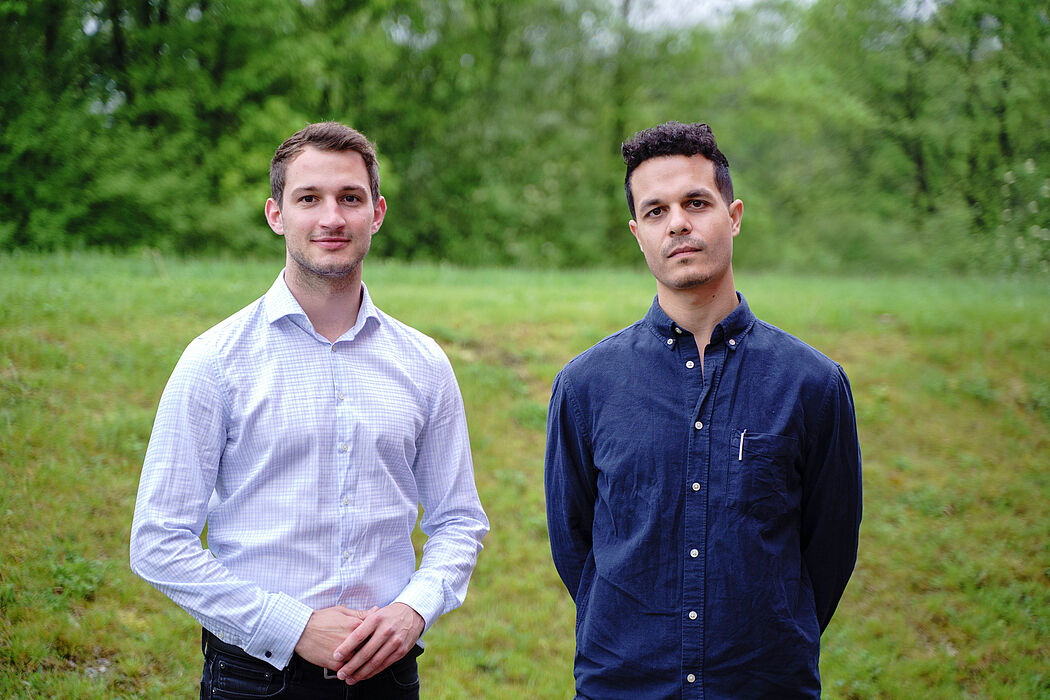"Ultimately, any idea is only as good as it is accepted and recognised by the market. So it shouldn't be developed alone in a quiet little room."
Since 2018, Jona Vogel, who is currently writing his Master's thesis at the Chair of International Business, has been working with his team on an initial idea that is now growing more and more into a marketable product. The aim of the start-up ENERVATE is to make it possible to move away from energy sources that are responsible for a large proportion of CO2 emissions.
Management, finance, economics or research - the Business Administration degree programme offers numerous perspectives. Jona Vogel, who is now in the final stages of his Master's thesis at the Chair of International Business, is well aware of this. Before Jona came to Paderborn, however, he studied Business Administration as part of a dual degree programme in Hamburg, Shanghai and Madrid. After successfully completing his Bachelor's degree, he received an attractive job offer from an engineering firm in Paderborn, which hired him as commercial manager for an ongoing research project.
Jona quickly recognised the interfaces between his studies and his day-to-day work. He took numerous courses in the field of founding start-ups and learnt about important business models and customer acquisition methods, among other things. "The theory helped me a lot with the actual evaluation of and dealings with customers." However, Jona describes the areas of strategy and finance in particular as his "hobbyhorse", which still benefits him today in his start-up. "In start-ups, there is a clear team focus so that everyone uses their skills in a way that is best for the team and the start-up."
The founding of ENERVATE
The idea for his current start-up ENERVATE came to the student while he was working as a commercial project manager in the engineering office that had brought him to Paderborn. He was enthusiastic about the project's technology and sees a major impact for climate protection. "The idea had been around for a few years, but unfortunately never made it to the market," Jona recalls. So he set himself the task of turning the initial idea into a product that would be marketable. Together with the managing director of the engineering firm and Amir Giebel, an environmental engineer, he then joined forces and founded the start-up ENERVATE. "All three of us believed in it - so why should the idea continue to lie in a drawer?"
Jona's task in the team is to make the existing expertise marketable and thus develop a marketable and sustainable product from a single research project. Jona therefore took the "Green Start-up Community" module from Prof Dr Rüdiger Kabst to further develop the existing business model. "At the beginning, the project only existed from an engineer's perspective - there was no marketability." The team has been supported from the outset by garage33, Paderborn University's start-up centre.
What is behind ENERVATE?
"Intelligent building refurbishment - that's what we do," says Jona, summarising his start-up. But what is behind it? Old buildings make up the majority of buildings in Germany and cannot be categorised as energy-efficient. Quite the opposite: the majority of old buildings that were built before 1978 and therefore before the introduction of thermal insulation regulations can be categorised as so inefficient that they are responsible for a large proportion of CO2 emissions. The aim of the start-up is therefore to turn away from energy sources that emit a lot of CO2 and, conversely, to switch to systems that are powered by renewable energies.
However, retrofitting a panel heating system in old buildings that can be powered by renewable energy would entail enormous expense. And this is precisely where the ENERVATE team's idea comes in: Panel heating systems are attached to the outside of the building and insulated. "You can think of it like underfloor heating from the outside - the house is basically wrapped up again," summarises Jona. This idea would therefore simplify the enormous complexity of refurbishment, which prevents many owners from refurbishing and therefore from switching away from oil and gas heating systems.
Can everyone start up?
"My advice is: just try it out," explains Jona Vogel. An idea inevitably has to be tried out, ideally directly on the market. He learnt the relevant models at the chair of Prof Dr Rüdiger Kabst and together with TecUp. "You just have to be shown the right way and Paderborn University offers the right opportunities and contact persons." Only by communicating your own idea is it possible to get in touch with the right contact points, develop a concrete business plan and approach customers.
The student is particularly keen to create a strong regional start-up ecosystem. "Tomorrow's employer is today's start-up founder!" In the course of his Master's thesis, he discovered that heterogeneous teams are more successful in the long term and that only a few women found start-ups in Germany. Jona Vogel goes on to say that this situation should change and therefore encourages more women to set up companies. "The university offers great access to the start-up scene and this should be utilised!"
Do you want that too?
More information
- about the M. Sc. in Business Administration
- about TecUP, the Technology Transfer & Start-up Centre at Paderborn University

